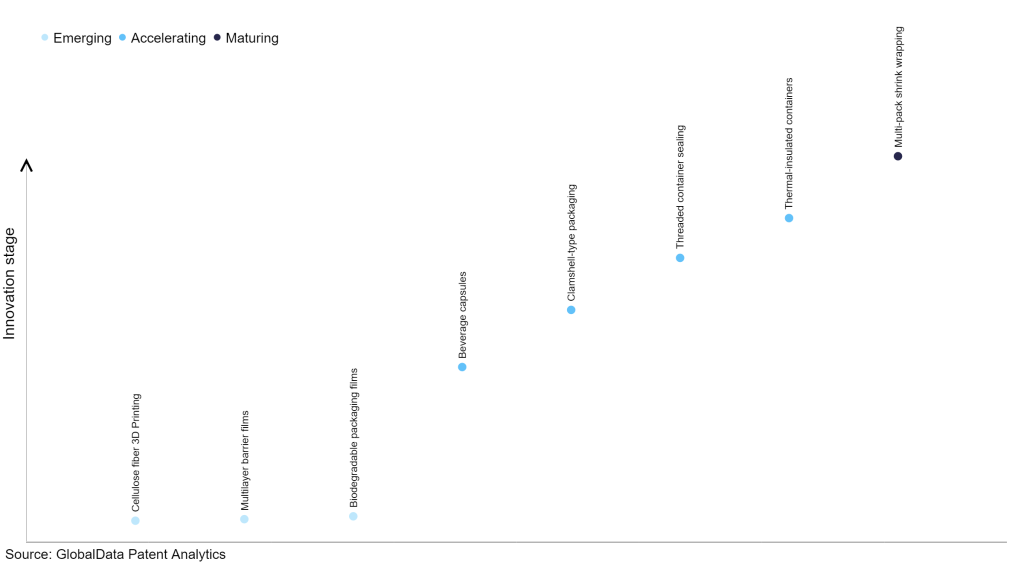The packaging industry continues to be a hotbed of patent innovation. Activity is driven by sustainability, personalization, visual appeal, and reususability, and growing importance of technologies such as 3D printing, artificial intelligence, RFID technology, and virtual reality. In the last three years alone, there have been over 18,000 patents filed and granted in the packaging industry, according to GlobalData’s report on Innovation in packaging: cellulose fiber 3D Printing. Buy the report here.
However, not all innovations are equal and nor do they follow a constant upward trend. Instead, their evolution takes the form of an S-shaped curve that reflects their typical lifecycle from early emergence to accelerating adoption, before finally stabilizing and reaching maturity.
Identifying where a particular innovation is on this journey, especially those that are in the emerging and accelerating stages, is essential for understanding their current level of adoption and the likely future trajectory and impact they will have.
30+ innovations will shape the packaging industry
According to GlobalData’s Technology Foresights, which plots the S-curve for the packaging industry using innovation intensity models built on over 83,000 patents, there are 30+ innovation areas that will shape the future of the industry.
Within the emerging innovation stage, cellulose fiber 3D Printing, multilayer barrier films, and biodegradable packaging films are disruptive technologies that are in the early stages of application and should be tracked closely. Beverage capsules, clamshell-type packaging, and threaded container sealing are some of the accelerating innovation areas, where adoption has been steadily increasing. Among maturing innovation areas are thermal-insulated containers and multi-pack shrink wrapping, which are now well established in the industry.
Innovation S-curve for the packaging industry

Cellulose fiber 3D printing is a key innovation area in packaging
Cellulose fiber 3D printing involves the use of cellulose, a renewable and biodegradable material, as a key component in 3D printing processes. Cellulose often comes in the form of nanocellulose - a lightweight and strong material derived from plant fibers - and is blended with other materials to create bioinks or filaments. These materials can then be used in 3D printers to create a variety of objects.
GlobalData’s analysis also uncovers the companies at the forefront of each innovation area and assesses the potential reach and impact of their patenting activity across different applications and geographies. According to GlobalData, there are 45+ companies, spanning technology vendors, established packaging companies, and up-and-coming start-ups engaged in the development and application of cellulose fiber 3D printing.
Key players in cellulose fiber 3D printing – a disruptive innovation in the packaging industry
‘Application diversity’ measures the number of applications identified for each patent. It broadly splits companies into either ‘niche’ or ‘diversified’ innovators.
‘Geographic reach’ refers to the number of countries each patent is registered in. It reflects the breadth of geographic application intended, ranging from ‘global’ to ‘local’.
Patent volumes related to cellulose fiber 3D printing
Source: GlobalData Patent Analytics
Teknologian Tutkimuskeskus VTT is one of the leading patent filers in cellulose fiber 3D printing. Some other key patent filers in the space include Kao, Konica Minolta, Seiko Epson, Arkema, and CelLink.
In terms of application diversity, CelLink leads the pack, while Spiderwort and Teknologian Tutkimuskeskus VTT stood in the second and third positions, respectively. By geographic reach, Kao held the top position, followed by CelLink and Arkema.
Cellulose fiber 3D printing is poised to gain popularity due to sustainability and its versatility across various industries. As environmental concerns continue to drive change in consumer behavior and industry practices, this technology is likely to play a significant role in sustainable manufacturing and product design.
To further understand the key themes and technologies disrupting the packaging industry, access GlobalData’s latest thematic research report on Packaging.
Data Insights
From

The gold standard of business intelligence.
Blending expert knowledge with cutting-edge technology, GlobalData’s unrivalled proprietary data will enable you to decode what’s happening in your market. You can make better informed decisions and gain a future-proof advantage over your competitors.



